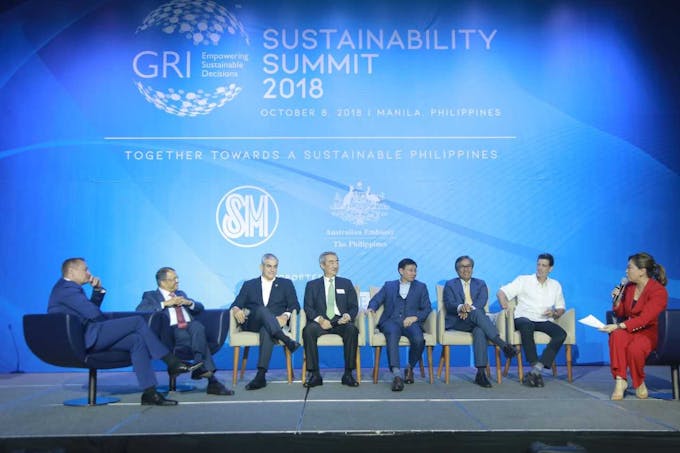Public listed companies (PLCs) in the Philippines will soon have to report their environmental, social and governance (ESG) performance to regulators, or explain why they have failed to do so.
To continue reading, subscribe to Eco‑Business.
There's something for everyone. We offer a range of subscription plans.
- Access our stories and receive our Insights Weekly newsletter with the free EB Member plan.
- Unlock unlimited access to our content and archive with EB Circle.
- Publish your content with EB Premium.
The Securities and Exchange Commission’s (SEC) ‘comply-or-explain’ regulation will take effect by the end of the year, two years after the government body announced it would make sustainability reporting part of its recommendations for corporate governance.
The first sustainability reports will be submitted in 2020.
Rose Carmela Gonzalez-Austria, assistant director for corporate governance and finance at the SEC, said the commission recognises that the Philippines is lagging with regulations to improve corporate governance. Sustainability reporting is mandatory in Thailand, Malaysia, and Indonesia, while Singapore has a comply-or-explain policy in place.
“
These insights lead to better decision making in the companies and will help capture long-term business benefits.
Tim Mohin, chief executive officer, Global Reporting Initiative
“Our intention is to promote greater transparency on ESG impacts and to provide an enabling regulation that would allow companies to appropriately communicate with their stakeholders,” she told Eco-Business via email.
The SEC is looking at making the sustainability reporting mandatory in the long term. “We recognise the need for companies to adjust and put in place the necessary systems and processes to release a sustainability report. As such, we are considering a “comply or explain” sustainability reporting requirement for the first few years,” Gonzalez-Austria said.
Tim Mohin, chief executive for Global Reporting Initiative (GRI), a non-profit standards body that helps companies report their impacts on issues such as climate change and human rights, welcomed this progress.

Chief executives from top conglomerates in the Philippines discuss corporate sustainability reporting at the first Global Reporting Initiative (GRI) summit in the country. Image: SM
He told Eco-Business that currently only 11 per cent of PLCs in the country report their sustainability performance, and regulation is one way to get everyone on board.
“The figures are quite low. Just under 40 per cent of market capitalisation on the Philippine stock market are reporting their sustainability performance, which means it’s only the big companies that are doing it,” he said. Market capitalisation is one of the best measures of a company’s size, as it refers to the total market value of a company’s outstanding shares of stock.
Reporting on their sustainability performance will enable businesses in the Philippines to make better investment decisions, Mohin said.
“Sustainability reporting offers companies the opportunity to better understand their impacts—both positive and negative—on society, the economy, and environment. These insights lead to better decision making and will help capture long-term business benefits,” he said.
Sustainability reporting also drives supply chain transparency, he added. “Companies have high expectations of their suppliers, and the medium for transparency between the buyer and the supplier is reporting,” Mohin told Eco-Business on the sidelines of the first GRI summit in the Philippines in October.
Gonzalez-Austria said that companies must see that increased transparency makes good business sense, as it improves risk management and promotes better investor relations.
“We don’t expect all companies to come out with excellent reports full of ESG material disclosures in the first few years, but we do expect them to begin their sustainability journey and gradually improve moving forward,” she said.








